Food, Inc. Blu-ray Movie
HomeFood, Inc. Blu-ray Movie 
Magnolia Pictures | 2008 | 94 min | Rated PG | Nov 03, 2009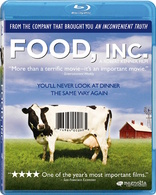
Price
List price:Amazon: $9.99 (Save 9%)
Third party: $9.99 (Save 9%)
Only 10 left in stock - order soon.
Movie rating
7.4 | / 10 |
Blu-ray rating
| Users | 4.0 | |
| Reviewer | 4.5 | |
| Overall | 4.0 |
Overview
Food, Inc. (2008)
In FOOD, INC., filmmaker Robert Kenner lifts the veil on our nation's food industry, exposing the highly mechanized underbelly that's been hidden from the American consumer with the consent of our government's regulatory agencies, USDA and FDA. Our nation's food supply is now controlled by a handful of corporations that often put profit ahead of consumer health, the livelihood of the American farmer, the safety of workers and our own environment.
Director: Robert Kenner| Documentary | 100% |
Specifications
Video
Video codec: VC-1
Video resolution: 1080p
Aspect ratio: 1.78:1
Original aspect ratio: 1.78:1
Audio
English: DTS-HD Master Audio 5.1 (48kHz, 24-bit)
Subtitles
English SDH, Spanish
Discs
25GB Blu-ray Disc
Single disc (1 BD)
BD-Live
Playback
Region free
Review
Rating summary
| Movie | 4.5 | |
| Video | 4.0 | |
| Audio | 4.0 | |
| Extras | 2.5 | |
| Overall | 4.5 |
Food, Inc. Blu-ray Movie Review
“Faster, fatter, bigger, cheaper.”
Reviewed by Casey Broadwater November 9, 2009If you were to ask me a few years ago where my food came from, I probably would’ve shot you a puzzled look and pointed to the supermarket across the street from my former apartment. This was before I got married, back when “food” was the cheapest frozen pizza the store carried, crude salads fashioned from whole heads of iceberg lettuce and not much else, chips with waxy nacho cheese, Hot Pockets, and the poor man’s feast: a peanut butter and jelly sandwich followed by a bowl of instant ramen. I didn’t think about the origins of my food; it appeared magically in the grocer’s freezer, pre-assembled, wrapped in plastic, encased in cardboard. Thankfully, I somehow managed to net a culinary goddess of a wife, make some hardcore foodie friends, and gradually discover a kind of laymen’s pleasure in choosing ingredients, mixing and matching spices, and tossing together a freshly prepared meal. But until I watched Food, Inc. yesterday, I was still only dimly aware of the path from farm to factory to supermarket shelf followed by most of the non-produce products I consume. Oh how my eyes have been opened.
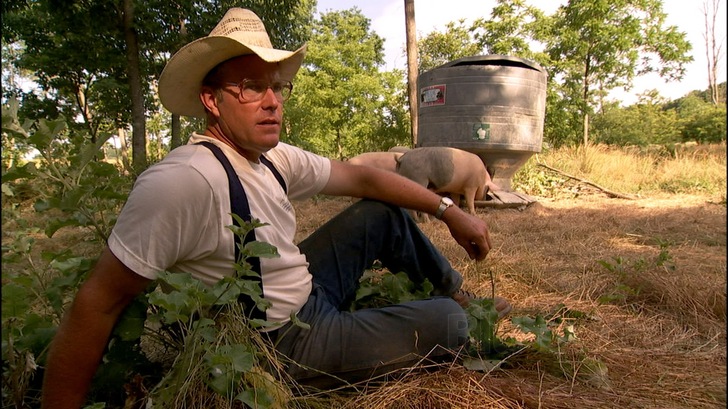
Joel Salatin reclined to be interviewed for the film.
Director Robert Kenner’s documentary intends to lift the veil, so to speak, that separates American consumers from the machinations of the food industry, which is now controlled by a small handful of mega-corporations. The bucolic image of farmers living quaint agrarian lives is largely bunk nowadays. Those that still toil the land slave under the thumb of company contracts, amassing debt and being bullied into using genetically modified seeds patented—and thereby owned—by the Monsanto corporation, which was previously known for creating Agent Orange during Vietnam. With the advent of fast food in the middle of the twentieth century, conformity and low-cost took precedence over quality and variety. The whole food production industry is now a complex assembly line that chugs to the rhythm of “faster, fatter, bigger, cheaper.” And fair enough, we all need to be fed. The world’s population isn’t exactly dwindling, and without efficient and mechanized agriculture, who knows where we’d be. However, Food, Inc. postulates that the system currently in place is not only economically unsustainable, but also environmentally destructive, fraught with dangers to public health, and inherently inhumane.
Authors Eric Schlosser (Fast Food Nation) and Michael Pollan (The Omnivore’s Dilemma) are the film’s narrators and key talking heads, but like most good documentaries, Food, Inc. combines salient facts and expert testimonials with visceral images that stay with you long after the film has finished. Next time you’re about to tuck into a juicy t-bone, consider an immense field of crowded cattle on a “factory farm,” all standing ankle high in their own fetid feces. Before popping open that KFC bucket, see a hen so pumped full of artificial hormones that she can no longer stand up, or thousands of Easter-yellow chicks riding conveyor belts and sliding down chutes, their demise only a few short weeks away. Hidden cameras capture the so-called “killing floor” of the largest meatpacking plant in the world, where 32,000 hogs are butchered and processed every day. While the meat industry takes a walloping here, Kenner traces the problems of production even further down the literal food chain. His biggest beef—sorry—is with corn.
Yes, corn, that delicious starch on a cob, is ultimately responsible for untold traumas, from obesity to E. coli. Government subsidies mean corn is incredibly cheap to produce, causing what Michael Pollan calls an “illusion of diversity” at your local grocery store. Take a look through your pantry and see how many packaged products contain maltodextrin or high fructose corn syrup or any of the countless other corn derivatives. Because of government funding, it’s cheaper to buy soda and candy than carrots and broccoli. The scales have been tipped toward unhealthy calories. What’s worse, we now feed corn to cows to fatten them up. I know, I know, that doesn’t sound so bad at first. But cows aren’t meant to eat corn; they should be grazing on grass and clover. A corn diet readily encourages the growth of E. coli in cows’ intestines. And when the cows are standing around in their own filth all day, the disease can spread quickly. Run off from factory farms now passes E. coli to lettuce and other vegetables. Studies have found that feeding a cow grass for just five days before it’s slaughtered flushes 80% of the E. coli out of its system. But that’s too sensible. Instead, a company called Beef Products, Inc. manufactures a hamburger meat filler that’s been cleansed with ammonia to kill E. coli. This filler is used in 70% of the hamburger in the United States. Think about that next time you fire up the grill.
The film presents countless injustices. Seed cleaner Moe Parr is sued by Monsanto for “encouraging farmers to break patent law,” when he’s really just trying to make an honest living helping those few farmers who don’t want to use Monsanto’s patented soybean seed. The Smithfield meatpacking company hires illegal migrant workers to man the assembly lines but to avoid massive raids they have an agreement with local immigration police to betray only a few workers at a time. The Gonzalez family can’t afford fresh produce, so they feed their kids at Burger King. Food safety advocate Barbara Kowalcyk’s son died of kidney failure after E. coli poisoning. Most damningly, we see how governmental regulatory organizations are controlled by former lobbyists for the industries they’re meant to be policing. The industries get more protection than we the people. If it all seems a little one-sided, it is, but that’s only because nearly every company that the filmmakers approached declined to be interviewed.
One of the film’s central figures is Joel Salatin, the owner of Polyface, a self-sustaining, ecologically friendly farm that is impressive on a small scale but puny when compared to the amount of food it takes to feed a nation. Salatin has an infectious personality; it’s clear to see he believes in what he does. He just wants to make good food and help heal the Earth. But the film never really answers the question of whether Salatin’s approach can be copied and enlarged to meet the demands of a meat-hungry populace. A list of helpful suggestions is tacked on to the end of the film—buy local and organic, stop drinking soda, read labels, lobby Congress, have a meatless Monday, etc.—and some may see this addendum as merely cursory. I can forgive the film for not having all the answers, though, because the real intent here is to simply expose what goes on behind all the endless bright and shiny packages that line supermarket aisles. The point is to cause awareness, to get us thinking for ourselves about the food we choose to eat. And ultimately, we have the choice and the power to sway the industry. One of the film’s final assertions is that every product we run across a grocery store scanner is a vote for whether we want local or not, organic or not, healthy or not.
Food, Inc. Blu-ray Movie, Video Quality 

Shot with the beguilingly bright colors of a supermarket aisle, Food, Inc. arrives on Blu- ray with a 1080p/VC-1 encoded transfer of the film's high definition video source material. To be honest, the film could look muckier than a factory farm and still be effective, but thankfully, this presentation is generally strong. As you'd expect from a documentary, colors are bold but realistic. There's no stylization here, no digital trickery or post-production color toning. What you see is what you get—a lifelike appearance. Black levels are adequately deep—though never as inky as you might see in a more cinematic film—and contrast is also kept within the bounds of reason. Clarity can be hit or miss. Close-ups show the fine facial detail you expect from high definition video, but some of the longer shots look slightly unresolved. As the documentary was shot on video, it occasionally exemplifies some of the shortcomings of the medium. Digital noise varies from being practically non-existent to buzzing heavily over the frame, depending on the lighting. There are a few instances of mild macroblocking—usually in background detail—and I spotted some slight banding during two or three scenes, through you'd really have to crane to spot it. Some of the talking head close-ups show some haloing on strong lines, but it's hard to tell if this is native to the camera that was used or if some edge enhancement was applied in post- production. Either way, it's never a distraction. Do note that the documentary uses a lot of archive footage that is obviously culled from standard definition sources. During these segments, which are often masked to mimic the shape of an older television screen, you'll spot lots of blocking and aliasing, though this is entirely unavoidable. It may sound like I've nitpicked a bit, but I really have no reservations about the look of Food, Inc.
Food, Inc. Blu-ray Movie, Audio Quality 
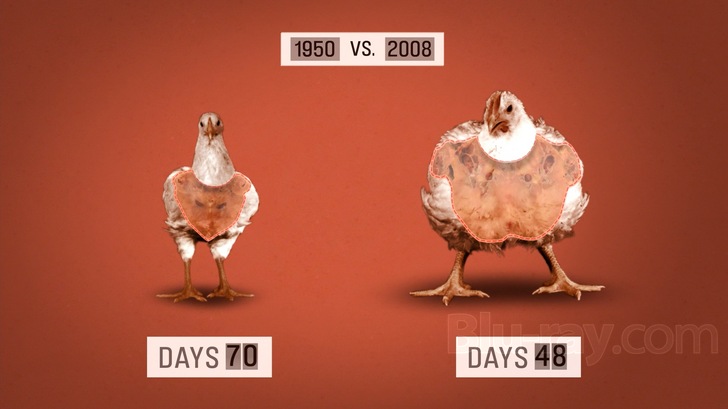
Going into a documentary, I'm never quite sure what to expect sound-wise. I was pleased, then, that Food, Inc. sports a DTS-HD Master Audio 5.1 track that is more than capable. While there are no swoops, swooshes, or multi-channel pans, no thundering sequences of deep LFE rumble, this track does exactly what it needs to do—broadcast the information presented with unwavering clarity. Obviously, almost all of the dialogue was captured on location, and voices are clear and easily understood throughout, never once getting lost in any of the surrounding noise. There are few environmental sounds to be heard in the rear channels—occasionally you'll hear cows moo or stampede—but the largely guitar-based music regularly fills all the speakers with detailed plucking, warm strumming, and satisfyingly deep and round bass notes. The mix is weighty and nicely balanced, putting clear priority on the voices of the interviewees. There's not much else to comment on here, other than the fact that there's no hissing, crackling, popping, or drop-outs to report.
Food, Inc. Blu-ray Movie, Special Features and Extras 
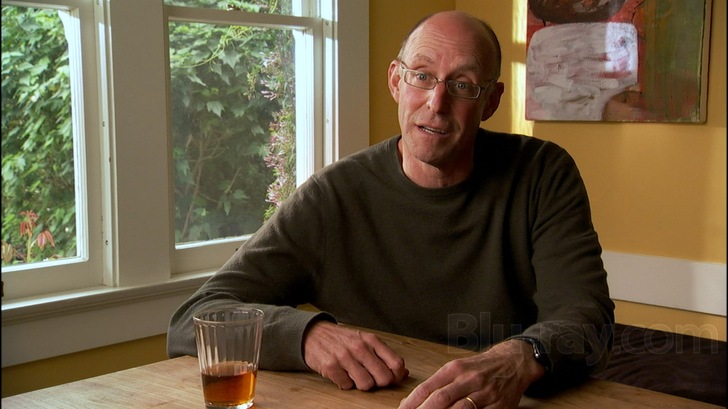
Deleted Scenes (SD, 37:44)
As soon as you finish watching the documentary, fire up these eight deleted scenes and continue
to be shocked by the shady tactics used by the Smithfield meatpacking plant, the pollution
caused by industrialized agriculture, and the dangers of an unpoliced food industry. It's not all
negative though, as we do get some redemptive optimism from Joel Salatin of the organic and
self-sustaining Polyface Farm.
Celebrity Public Service Announcements (SD, 7:14 total)
Includes seven PSAs, featuring Martin Sheen, Kelly Preston, Alyssa Milano, John Salley, Anthony
LaPaglia, and Gia Carides.
ABC News Nightline "You Are What You Eat": Food with Integrity (SD, 7:21)
"Just because it's fast doesn't mean it has to be a typical fast food experience," says Chipotle
founder Steve Ells, who explains here the burrito chain's refusal to buy meat from factory farms,
relying instead on smaller, free-range operations.
"The Amazing Food Detective" and "Snacktown Smackdown": Stay Active and Eat Healthy
(SD, 3:05)
Kaiser Permanente sponsored these two promos, which are aimed at giving kids an awareness of
healthy eating.
Resources
A list of 19 websites that offer more information about the food industry.
Theatrical Trailer (1080p, 2:12)
Also from Magnolia Home Entertainment Blu-ray (1080p, 7:15 total)
Includes high definition trailers for The Answer Man, The Great Buck Howard,
and Is Anybody There?
BD-Live Functionality
Food, Inc. Blu-ray Movie, Overall Score and Recommendation 
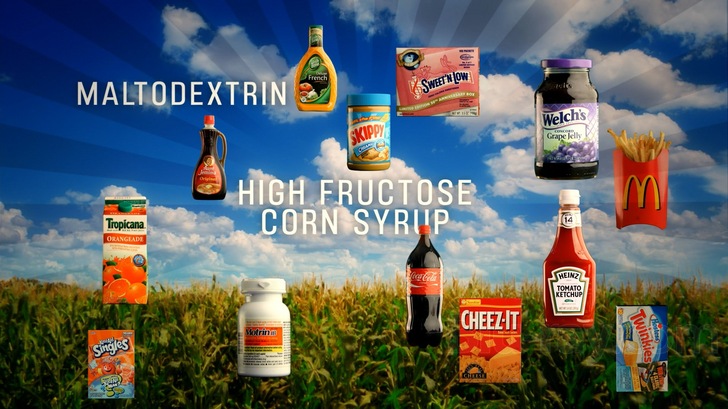
Food, Inc. is frightening and inspiring, a literal revelation of the unchallenged paradigm that has ruled the food industry since the middle of the twentieth century. You may learn some things you'll wish you hadn't. You'll definitely see some things that'll make a distinct impression. And while your dining practices may not be immediately altered, you'll probably find yourself at least questioning the origins of the food you choose to eat. Highly recommended.
Similar titles
Similar titles you might also like

Fahrenheit 11/9
2018

A Place at the Table
2012

Why We Fight
2005

Waiting for "Superman"
2010

Prohibition
2011

An Inconvenient Sequel: Truth to Power
2017

Capitalism: A Love Story
2009

RBG
2018

I Am Not Your Negro
2016

Where to Invade Next
2015

Citizenfour
2014

Sicko
2007

Bowling for Columbine
2002

The Dust Bowl
Ken Burns
2012

America: Imagine the World Without Her
2014

Whitey: United States of America V. James J. Bulger
2014

Stephen Fry in America
2007

Dinosaur 13
Director's Cut
2014

Forks Over Knives
2010

American Experience: Freedom Riders
2011